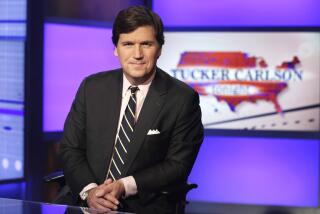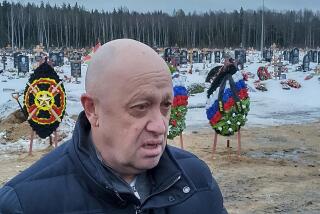Differences Likely to Mark First Christopher-Primakov Encounter
- Share via
HELSINKI, Finland — At a modest state guest house in this wintry capital on Russia’s doorstep, Secretary of State Warren Christopher will have the chance today to take the measure of a new Kremlin counterpart whose Communist past and eastern focus underscore Russia’s drift from the West.
Christopher’s first one-on-one meeting with newly appointed Russian Foreign Minister Yevgeny M. Primakov has been billed in Moscow as a simple courtesy call by the traveling American and a convenient opportunity for the two statesmen to get acquainted.
But the first brush between the top diplomats of the superpowers is likely to be shadowed by their governments’ adversarial views over NATO expansion, a Russian sale of nuclear technology to Iran, Balkan policy and nagging questions about Moscow’s commitment to market reforms and democracy.
Christopher has global visions of expanding the bloc of democratic nations and the U.S.-centered Western military alliance. He also will want greater Russian cooperation in dealing with major hot spots.
Primakov, 66, a career Middle East specialist who has wielded quiet influence with every Soviet and Russian leader since Leonid I. Brezhnev, has deplored the proposed eastward expansion of the North Atlantic Treaty Organization and called for the “inevitable” re-integration of the former Soviet Union. The former intelligence chief and longtime friend of Iraqi President Saddam Hussein is likely to use his session with Christopher to give notice that he will chart a more independent course for Moscow, even at the risk of widening the divide with Washington.
After their meeting concludes Saturday, both sides may speak diplomatically of frank, fruitful discussions to be continued when Christopher makes an official visit to Russia next month. But U.S. officials and analysts predict significant differences will emerge behind the closed doors, perhaps creating the chilliest atmosphere since the Cold War.
This meeting will “strip away the illusions of the early 1990s about Russian intentions and goals,” said Peter Rodman, a Reagan administration official and director of national security studies at the Nixon Center for Peace and Freedom in Washington.
From the workstations at the CIA to the drab corridors of the World Bank, Primakov’s appointment in early January to replace the affable Andrei V. Kozyrev was greeted in Washington with something between astonishment and fear.
The news “sent a chill among specialists” who have deep suspicions about the man and his agenda, said Robert O. Freedman, acting president of Baltimore Hebrew University and a Mideast specialist who has known Primakov more than 20 years. Until a few weeks ago, one of Primakov’s jobs was to orchestrate spying on the U.S.
Russian analysts tend to agree that the change in personalities at the Foreign Ministry will adversely affect the diplomatic climate. “Russian foreign policy will not suffer any serious transformations in content, but its form may undergo tactical changes,” said Alexander A. Konovalov, a foreign policy expert with the Moscow-based USA-Canada Institute.
Konovalov warned that with a hotly contested presidential election set for June, Kremlin foreign policy will focus on the “near abroad”--the newly independent countries of the former Soviet Union--and take a more aggressive position in defending Russia’s national interests. Primakov’s first trips as foreign minister have been to Tajikistan and Ukraine, two former Soviet republics with unresolved security issues with Moscow.
While Christopher and Primakov can be expected to disagree strongly over NATO expansion and alliance actions in the Balkans, they share a common interest that will be a centerpiece of their summit: Mideast peace.
In what is expected to be his last year as secretary of state, Christopher hopes a Syrian-Israeli deal, the final leg of the peace process, will be his legacy in U.S. diplomacy. And after decades of Soviet funding and arming of radical Arab states, Russia is a co-sponsor of the talks.
But elsewhere in the Mideast, the two statesmen are likely to be at odds, especially in discussing Iran and Iraq. As head of Russian intelligence, Primakov developed strong ties with his Iranian counterpart, Ali Fallahian, one of the most active proponents of Iranian extremism abroad, U.S. officials report. Primakov visited Tehran in February 1995, then sponsored a visit by Fallahian to Moscow in July.
“Directors of intelligence don’t meet with each other without agreements on exchanging information,” a senior Pentagon official said. “Primakov has an interest in more than just selling nuclear reactors and guns to Iran. His ties are also part of a new strategic relationship that gives Russia an entry to [Persian] Gulf politics.”
Washington’s repeated efforts to discourage Moscow from selling nuclear technology worth more than $1 billion to rogue Iran met fierce resistance from the Kremlin, which considers the United States naive and bullheaded in its policy toward the Gulf power. Washington views Russia as opportunistic and immoral when it comes to Iran.
Pentagon officials are also still bitter about Primakov’s meddling in the run-up to the 1991 Persian Gulf War, when he went to Baghdad and tried to plea-bargain on Iraq’s behalf to forestall the U.S.-led military campaign. Moreover, Russia and Iraq on Wednesday signed a $10-billion deal to redevelop Iraq’s oil industry.
In Helsinki, Primakov is expected to ask for U.S. leniency on Iraq, specifically on economic sanctions resulting from the Gulf War. Moscow is again making moves to ease the crippling U.N.-imposed embargo, which could open the way for Russian trade and repayment of billions owed by Baghdad for weapons. Russia has already won support from France, China and Egypt.
Another major region of policy conflict is the Balkans. The Russian Foreign Ministry accused U.S.-led NATO of fostering a policy of “genocide” with alliance air raids against Bosnian Serbs last summer. As fellow Slavs and adherents of the Eastern Orthodox Church, Russians take a far more forgiving view than Westerners of Serbian nationalists.
Moscow has contributed a small contingent of troops for the NATO-led mission trying to implement a U.S.-brokered Balkan peace agreement. But Russia remains protective of the Serbs and wary of the Western alliance’s activities in the region.
While Primakov may differ bitterly with Christopher over Western intervention in the Balkans--the very issue that prompted President Boris N. Yeltsin to fire Kozyrev--the Kremlin’s lack of a credible alternative policy for the region may encourage the new Russian foreign minister to avoid that subject.
On a personal level, Primakov differs in style and perspective from his two predecessors, Kozyrev and Soviet Foreign Minister Eduard A. Shevardnadze. Kozyrev was viewed by many in Moscow as too conciliatory to the West, while Primakov’s appointment has been praised even by Yeltsin rivals in the resurgent Communist Party.
Although Primakov is “not a reckless antagonist of the West,” he is “a coldblooded analyst of national interests” who feels Russia should be a greater power, said Rodman, the national security analyst.
Wright reported from Helsinki and Williams from Moscow.
More to Read
Sign up for Essential California
The most important California stories and recommendations in your inbox every morning.
You may occasionally receive promotional content from the Los Angeles Times.













